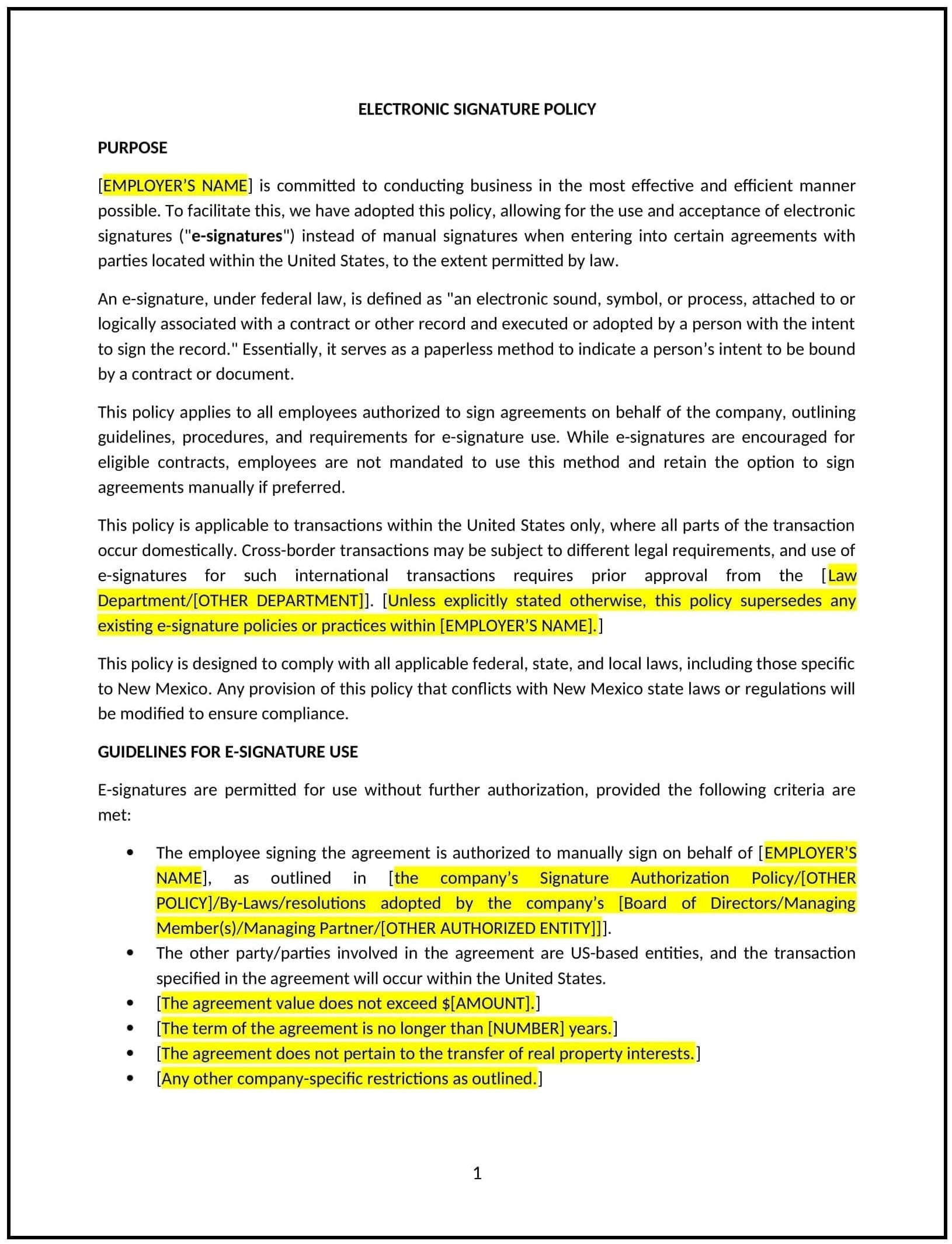Electronic signature policy (New Mexico): Free template
Got contracts to review? While you're here for policies, let Cobrief make contract review effortless—start your free review now.

Customize this template for free
Electronic signature policy (New Mexico)
This electronic signature policy is designed to help New Mexico businesses implement secure and legally valid electronic signatures for documents and transactions. It outlines the procedures for using electronic signatures, including how they should be applied, stored, and authenticated, to ensure that digital transactions are completed efficiently and securely.
By adopting this policy, New Mexico businesses can streamline document signing, reduce paperwork, and ensure that electronic signatures are legally recognized under New Mexico state law and federal regulations.
How to use this electronic signature policy (New Mexico)
- Define acceptable uses for electronic signatures: Clearly specify the types of documents and transactions that can be signed electronically, such as contracts, agreements, and other business transactions that require a signature.
- Set authentication procedures: Outline the methods that will be used to authenticate electronic signatures, ensuring that the identity of the signer is verified, such as using password protection, multi-factor authentication, or secure platforms.
- Specify the technology and platforms to be used: Identify the software or platforms that will be used for electronic signatures, ensuring they meet security standards and are capable of tracking and verifying signature timestamps and signers.
- Establish record-keeping requirements: Define how electronic records and signed documents will be stored, ensuring that they are securely archived and easily accessible for future reference or legal purposes.
- Reflect New Mexico-specific considerations: Address any specific state laws or regulations in New Mexico that may apply to electronic signatures, such as compliance with the New Mexico Uniform Electronic Transactions Act (UETA) and the federal Electronic Signatures in Global and National Commerce Act (ESIGN).
Benefits of using this electronic signature policy (New Mexico)
Implementing this policy provides New Mexico businesses with several advantages:
- Streamlines operations: Electronic signatures allow businesses to complete transactions faster by reducing the need for physical paperwork, speeding up processes, and increasing efficiency.
- Reduces costs: By eliminating the need for paper, printing, postage, and physical storage, businesses can significantly reduce overhead costs associated with document handling.
- Enhances security: Electronic signatures provide a more secure method of signing documents, with the ability to track signatures and authenticate signers, reducing the risk of fraud or unauthorized changes to documents.
- Supports remote work: The ability to sign documents electronically enables businesses to continue operations smoothly, even when employees, clients, or partners are working remotely.
- Increases legal certainty: Electronic signatures are legally binding and recognized under New Mexico state law and federal regulations, ensuring that signed documents hold up in court if necessary.
Tips for using this electronic signature policy (New Mexico)
- Communicate the policy clearly: Ensure all employees understand the process for using electronic signatures, including what types of documents can be signed electronically and the steps for verifying a signer’s identity.
- Train employees: Provide training on how to properly use electronic signature software, including how to ensure the security and integrity of signed documents.
- Choose secure platforms: Use reputable and secure platforms for electronic signatures, ensuring that they meet all necessary legal, security, and privacy requirements for the business and the state of New Mexico.
- Keep detailed records: Store all electronically signed documents in a secure and easily accessible location. The business should be able to retrieve records and provide proof of the signing process if needed.
- Review and update the policy regularly: Review the policy periodically to ensure that it aligns with New Mexico’s evolving legal requirements, business needs, and technological advancements.